 THE POPE AT FOSSE ARDEATINE
THE POPE AT FOSSE ARDEATINE
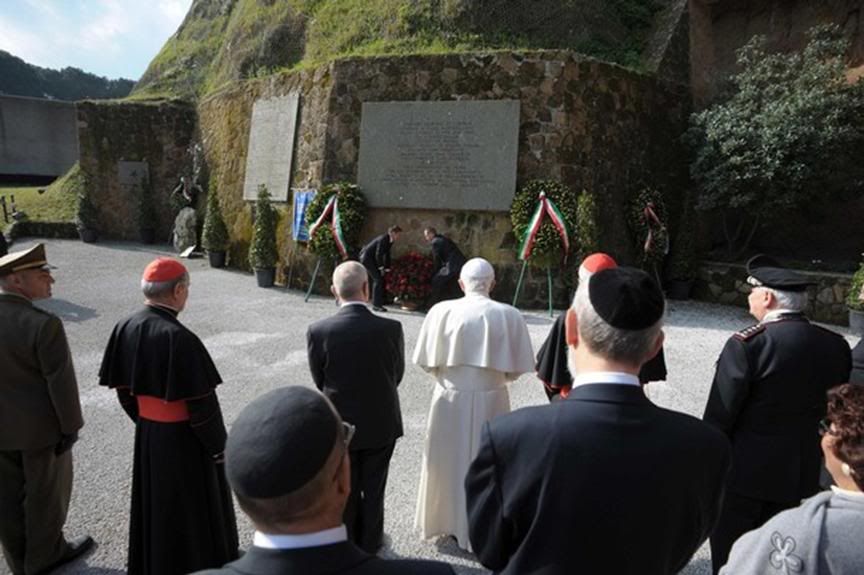
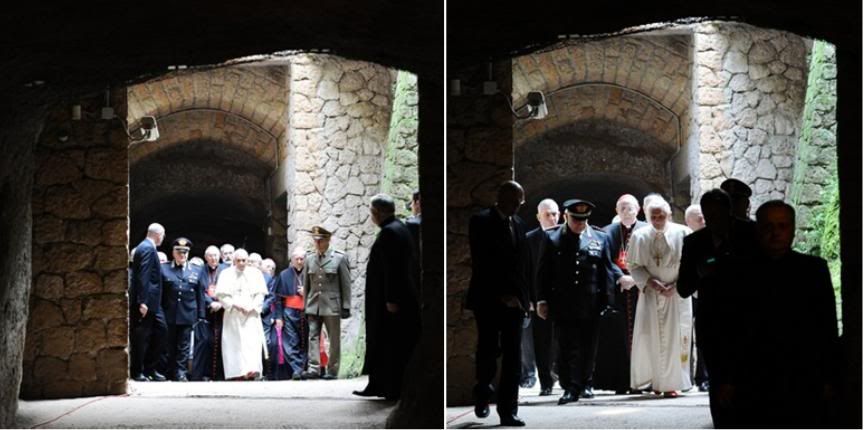
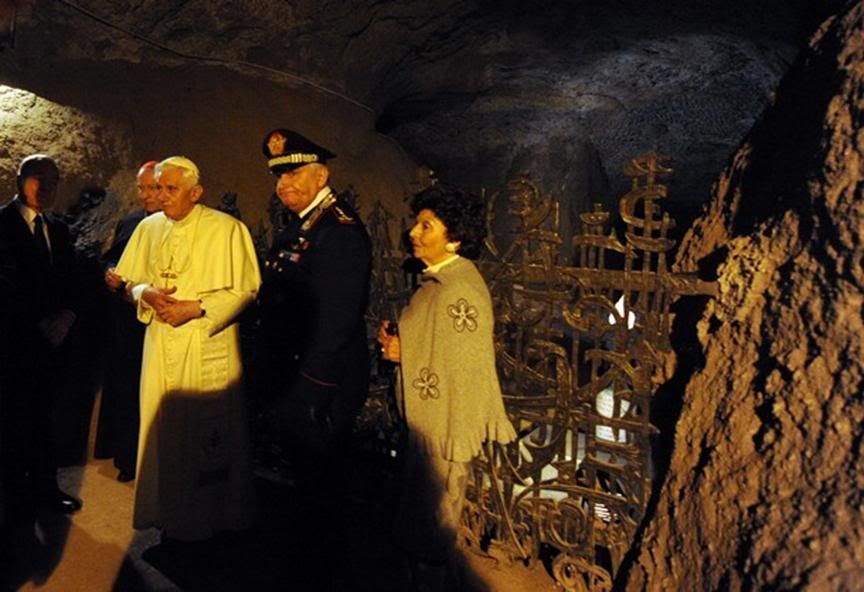
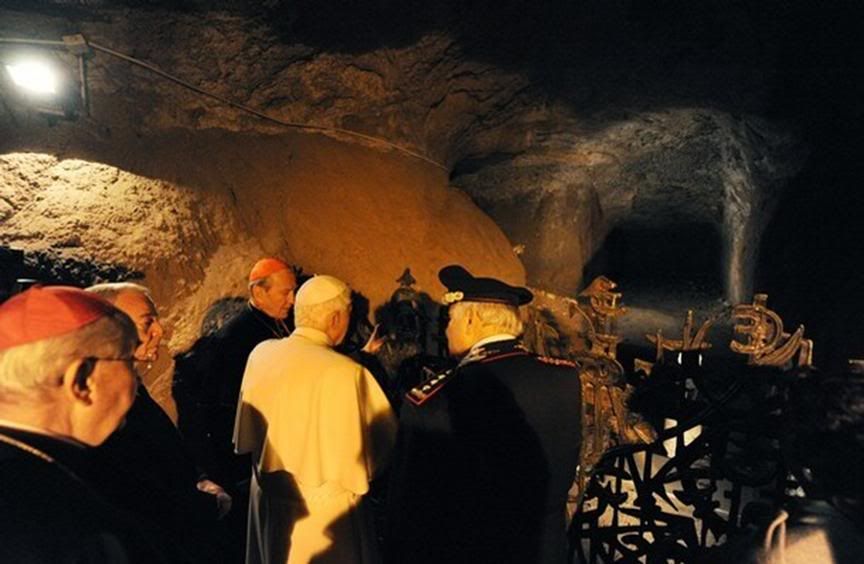
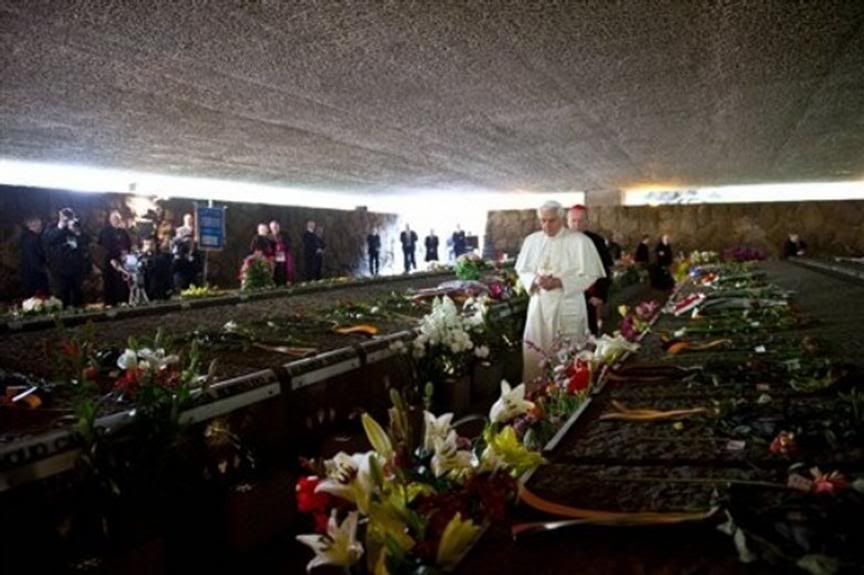 At Fosse Ardeatine:
At Fosse Ardeatine:
Pope recalls horror
of wars, past and present

March 27, 2011
Pope Benedict XVI, visiting the site of a World War II massacre, remembered the “abhorrent effects” of war, of violence on man by man, and at the Angelus later, he reiterated his continuing appeal for an end to the use of weapons and space for dialogue in the conflicts that are currently raging in Libya and the North African region.
Poignantly underscoring this renewed Papal appeal, were the images of Pope Benedict Sunday morning, as he walked among the tombs of 335 Italians massacred in the Fosse Ardeatine, (Ardeatine caes, formerly quarries), during the Nazi Occupation on March 24, 1944, in retaliation for a partisan attack on Nazi troops in central Rome a day earlier.
Adolf Hitler himself ordered the execution within 24 hours of ten Italians for every one German killed in that attack. 335 Italians, most of them priners in two of the Nazi prisons in centrla Rome, were rounded up and transported to the old quarry site on Via Ardeatine, brought into the caves and, one by one, shot dead at point blank range.
The victims included Italian army officers, resistance fighters, innocent civilians and 75 members of the city’s Jewish community. The youngest victim was 15 years old.
On Sunday, accompanied by Rome’s Chief Rabbi Riccardo Segni, and Cardinal Andrea Cordero Lanza di Montezemolo, emeritus Archpriest of St Paul’s outside the Walls, the Pope laid a basket of red roses at the feet of the plaque commemorating the victims.
He then entered the cavern containing the tombs, pausing before three; the first, that of Cardinal Montezemolo’s father, who was a colonel in the Italian army and a resistance leader. The second, that of Don Pietro Pappagallo a priest of the Roman diocese proclaimed a XX century martyr by John Paul II, for his self sacrifice in helping those persecuted under the Fascist and Nazi regimes; and finally that of Alberto Funaro, a Jew, whose nephew, a Rabbi of the same name, stood alongside the Pope as he prayed.
Emerging from the darkened crypt, Pope Benedict addressed a gathering of families and relatives of the Ardeatine victims, and said:
“What happened here March 24, 1944 is a most grave offense against God, because it is the deliberate violence of man by man. It is the most abhorrent effect of war, any war, while God is life, peace, communion...
Like my predecessors, I have come here to pray and renew the memory. I have come to invoke Divine mercy, which alone can fill the void, the abyss opened by men who, when driven by blind violence, deny their dignity as children of God and brotherhood with each other...
Yes, wherever he is, on every continent, in every nation, man is the son of that Father in heaven, he is brother to all humanity. But this being the son and brother is not a given.
Unfortunately, this is revealed by the Ardeatine Caves themselves. We must want it, we must say yes to good and no to evil. We must believe in the God of love and life, and reject any false image of God, that betrays His holy name and thus betrays man, made in His image.
Therefore, in this place, a painful reminder of the most horrendous evil, the real answer is to join hands as brothers, and say: Our Father, we believe in You, and with the strength of Your love we desire to walk together in Peace, in Rome, Italy, in Europe, throughout the world.
Before taking his leave, in the book of witness at the entrance to the cave, Pope Benedict wrote:' Non timebo quia Tu mecum es' - I shall fear no evil, because You are with me.
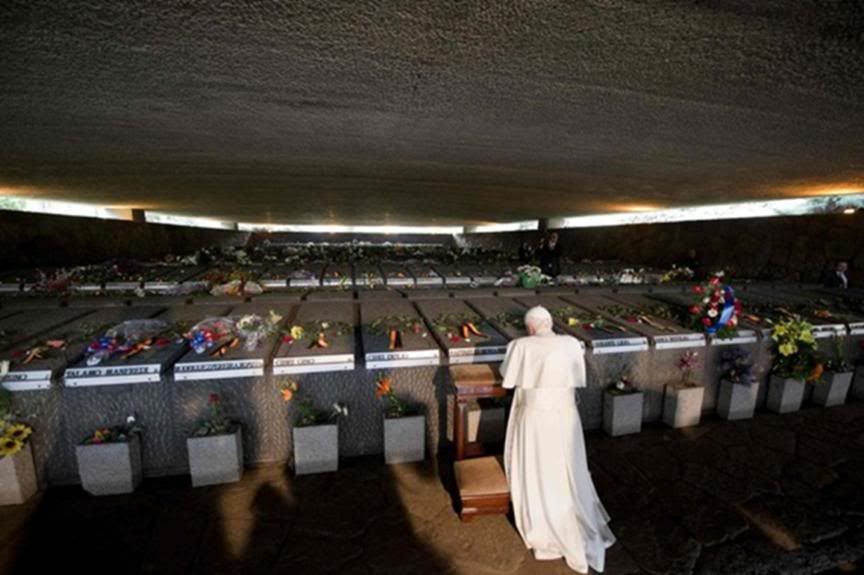
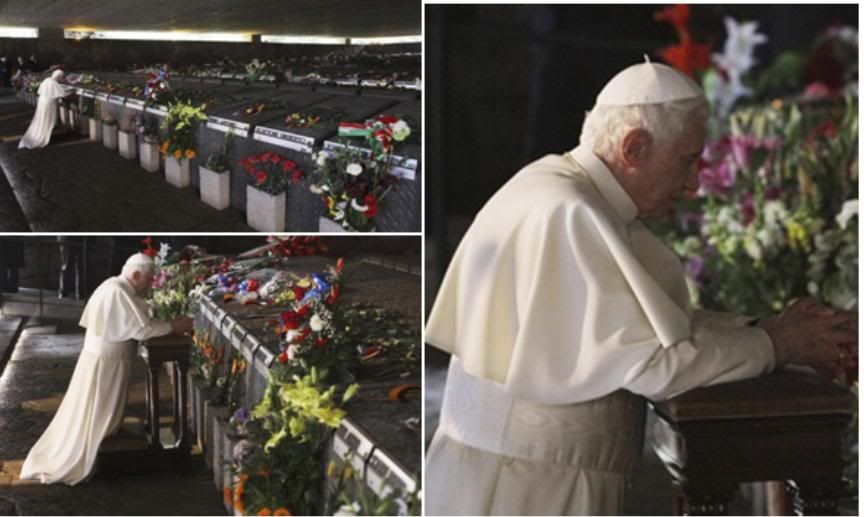
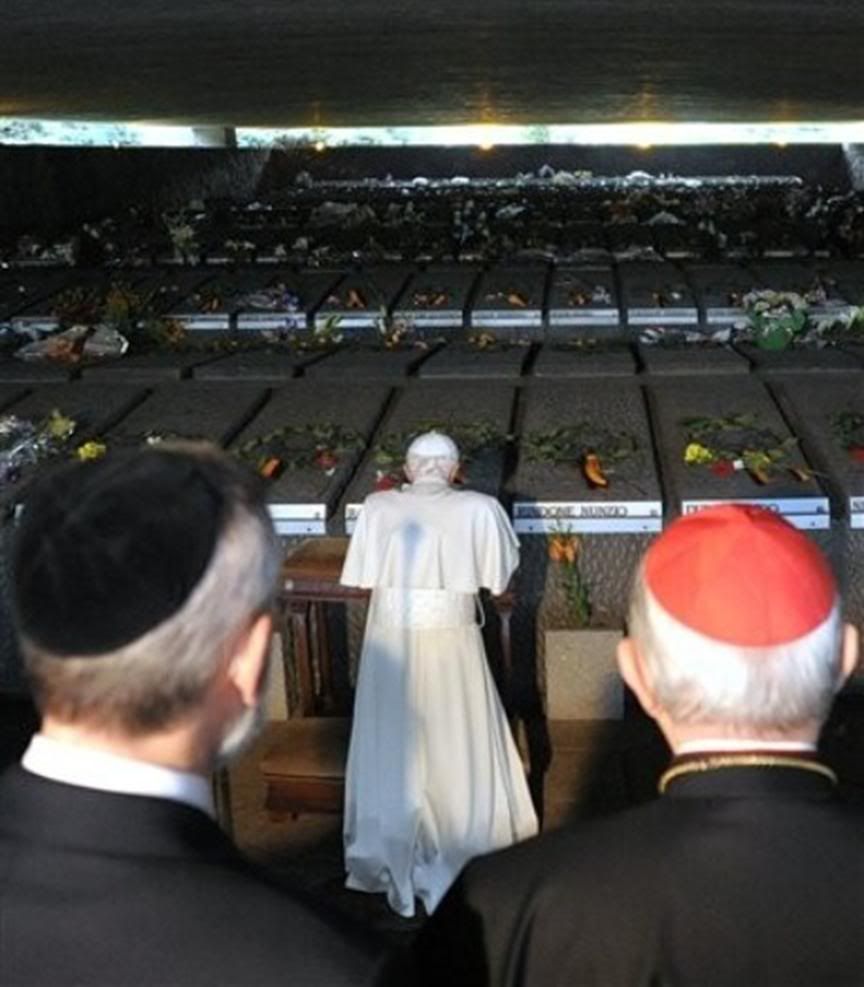
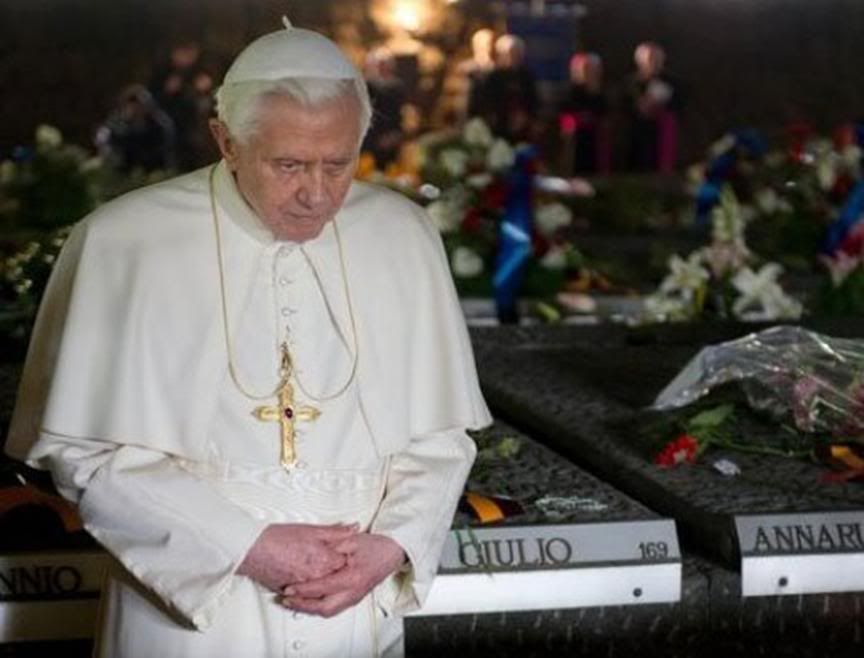
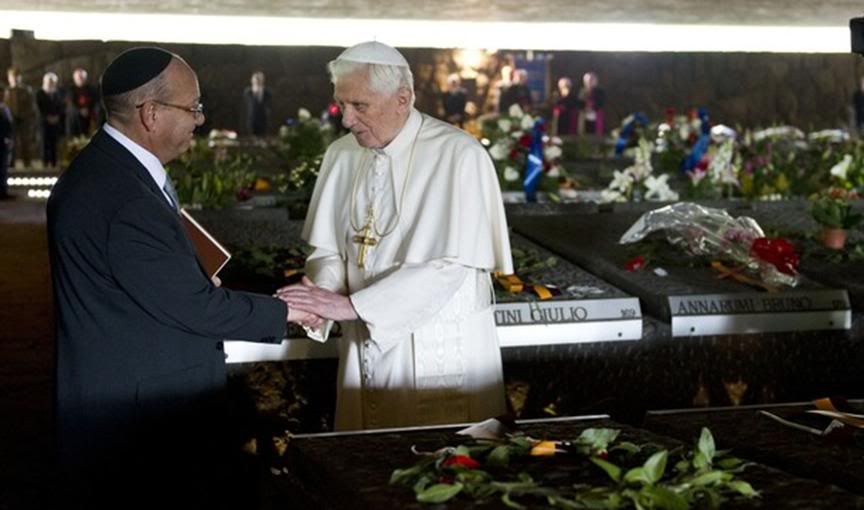
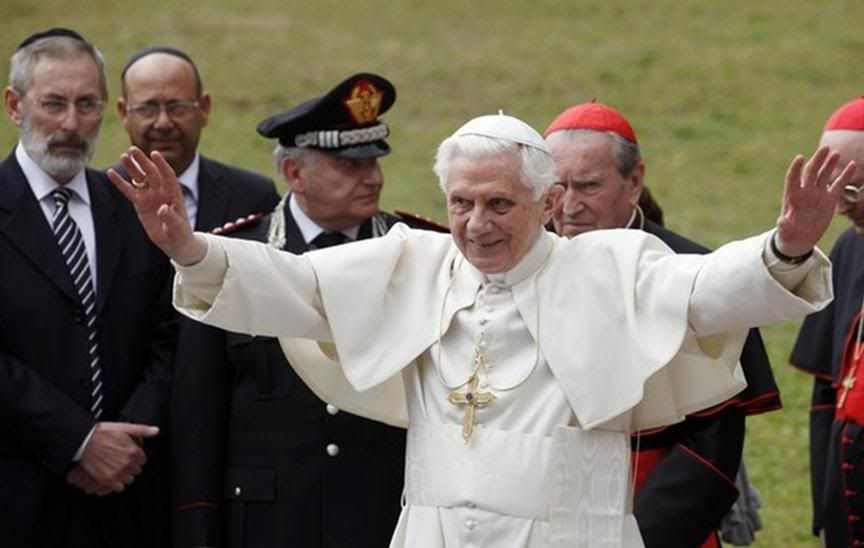
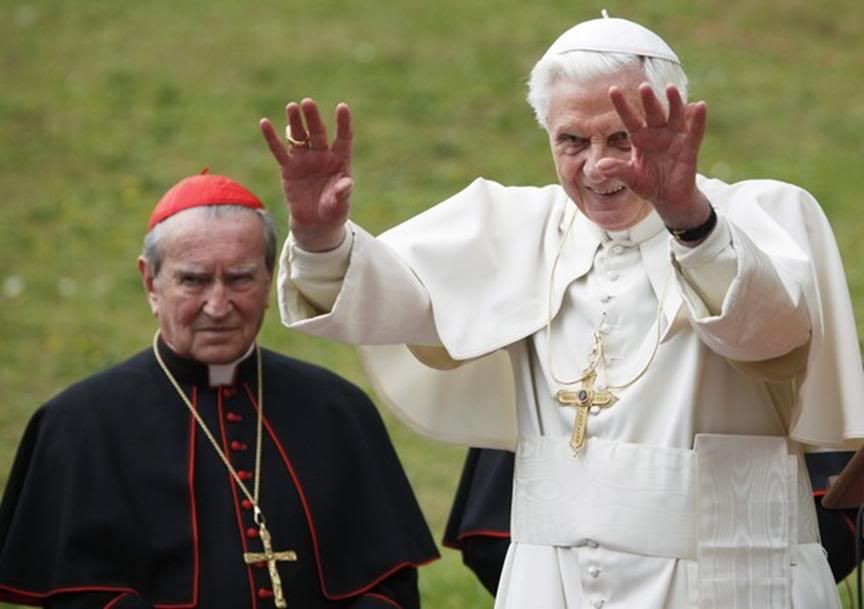
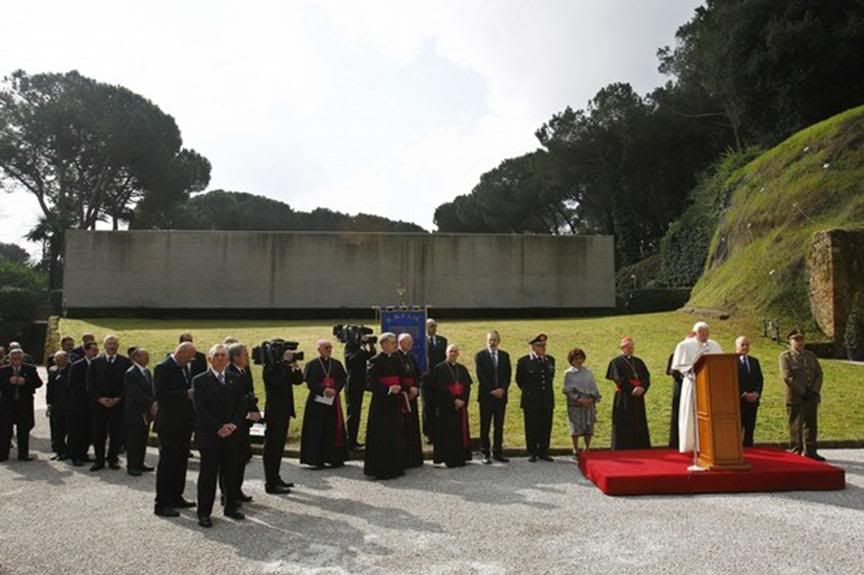
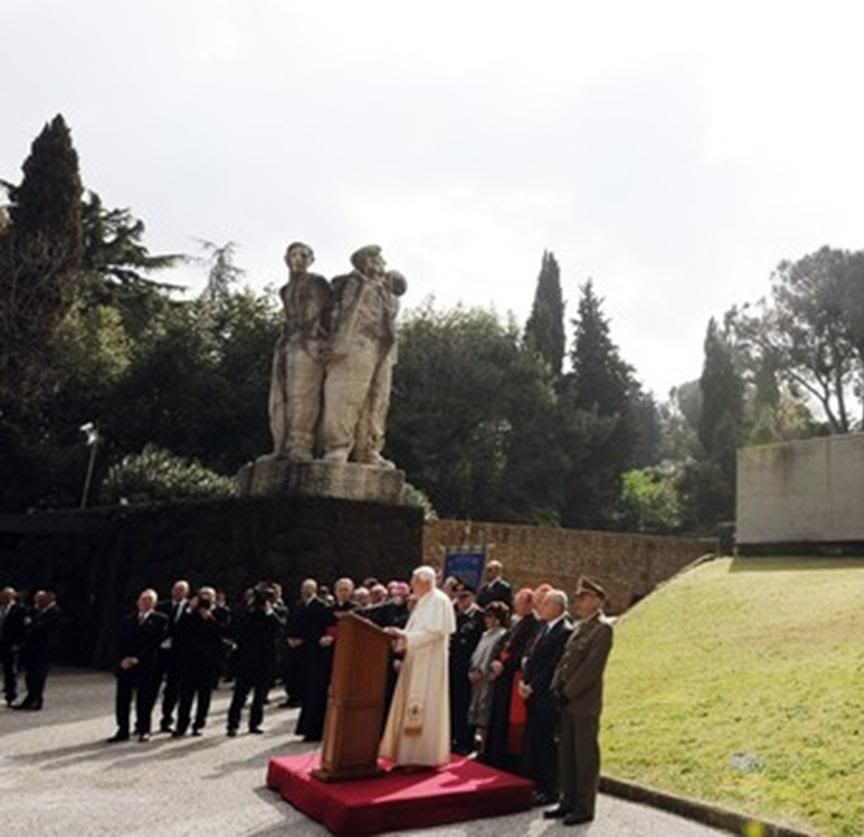
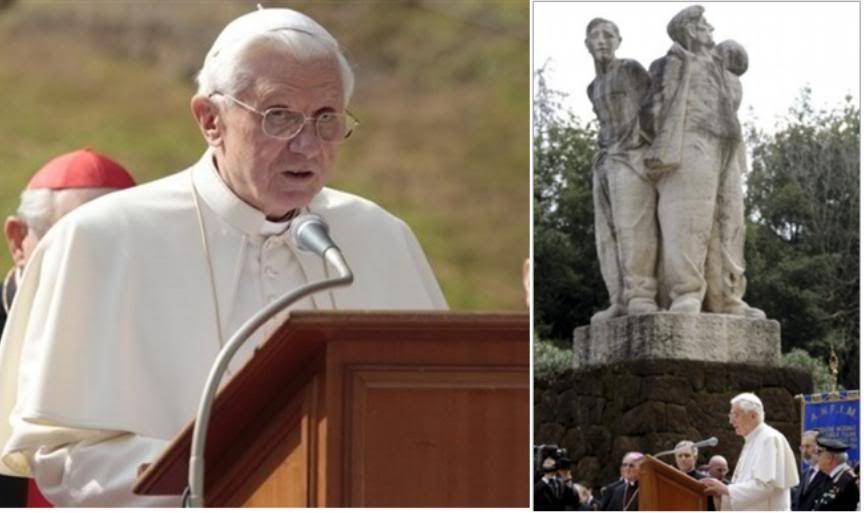
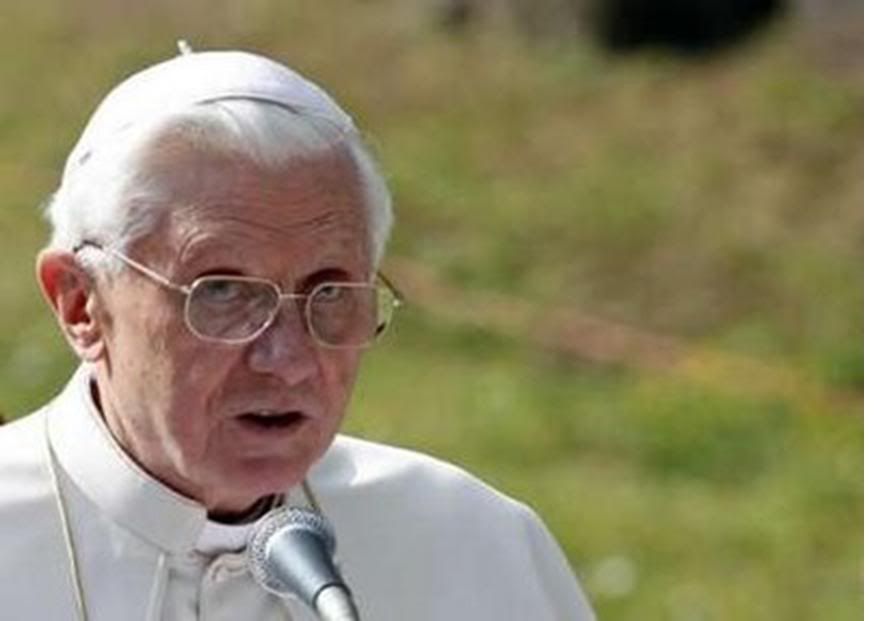 Here is the full text of the Pope's address, in a translation provided by Vatican Radio:
Here is the full text of the Pope's address, in a translation provided by Vatican Radio:
Dear brothers and sisters!
I very gladly accepted the invitation of the “National Association of Italian families of the martyrs who died for the freedom of the Fatherland" to make a pilgrimage to this shrine, dear to all Italians, particularly the Roman people.
I greet the Cardinal Vicar, the Chief Rabbi, the President of the Association, the Commissioner General, the Director of the Mausoleum and, especially, the families of victims as well as all those present.
"I believe in God and in Italy / I believe in the resurrection / of the martyrs and heroes / I believe in rebirth / and in my homeland / in the freedom of the people."
These words were engraved on the wall of a torture cell, in Via Tasso in Rome during the Nazi occupation. It is the testimony of an unknown person, who was imprisoned in that cell, and demonstrates that the human spirit remains free even in the harshest conditions.
"I believe in God and in Italy": these words struck me because this year marks the 150th anniversary of the unification of Italy, but mainly because it affirms the primacy of faith, from which to draw confidence and hope for Italy and its future.
What happened here March 24, 1944 is a most grave offense against God, because it is the deliberate violence of man against man. It is the most odious effect of war, any war, while God is life, peace, communion.
Like my predecessors, I have come here to pray and renew the memory. I have come to invoke Divine mercy, which alone can fill the void, the abyss opened by men who, when driven by blind violence, deny their dignity as children of God and brotherhood with each other.
I, too, as Bishop of Rome, a city consecrated by the blood of the martyrs of the Gospel of Love, I come to pay homage to these brothers, who were killed not far from the ancient catacombs.
"I believe in God and in Italy." In this testimony etched in a place of violence and death, the link between faith and love of country appears in all its purity, without any rhetoric.
Whoever wrote those words did so only for personal conviction, as his last testimony to the truth he believed, which renders the human spirit regal even at its extreme abasement. Every man is called to achieve their own dignity in this way, testifying to that truth which he recognizes with his own conscience.
Another testimony struck me, and this was found here in the Ardeatine Caves. A sheet of paper on which a victim had written: "God my great Father, we pray so that you can protect Jews from the barbaric persecution. 1 Pater Noster, Ave Maria 10, 1 Gloria Patri."
At that moment so tragic, so inhuman, in the heart of that person was the highest prayer, "God my great Father." Father of all! Just as on the lips of Jesus, dying on the cross: "Father, into thy hands I commend my spirit."
In that name, "Father", is the sure guarantee of hope, the possibility of a different future, free from hatred and revenge, a future of freedom and fraternity, for Rome, Italy, Europe and the world.
Yes, wherever he is, on every continent, in every nation, man is the son of that Father in heaven, he is brother to all humanity. But son and brother is not a given. Unfortunately, this is revealed by the Ardeatine Caves themselves. We must want it, we must say yes to good and no to evil.
We must believe in the God of love and life, and reject any false image of God, that betrays His holy name and thus betrays man, made in His image.
Therefore, in this place, a painful memorial of the most horrendous evil, the real answer is to join hands as brothers, and say: Our Father, we believe in You, and with the strength of Your love we desire to walk together in Peace, in Rome, Italy, in Europe, throughout the world. Amen.
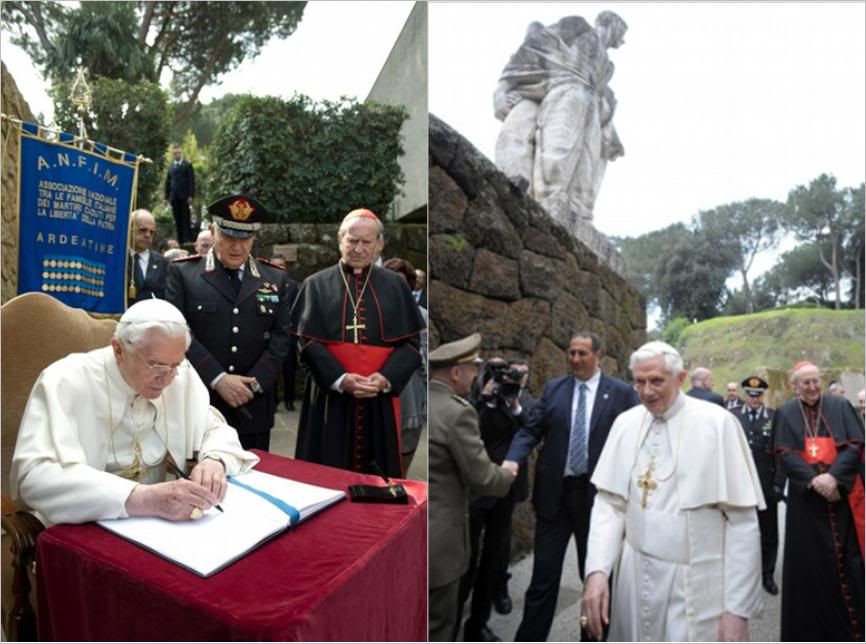 Pope visits Roman site
Pope visits Roman site
of 1944 Nazi atrocity
By FRANCES D'EMILIO

ROME, March 27 (AP) — Pope Benedict XVI on Sunday prayed at the memorial to victims of a 1944 massacre that was one of the worst atrocities by German occupiers in Italy during World War II and denounced what he called the "abominable" legacy of violence unleashed during war.
The visit won Jewish praise that Benedict had taken yet another step to heal centuries of painful Vatican-Jewish relations.
The German-born Pontiff visited the Ardeatine Caves on the outskirts of Rome to mark the anniversary of the killings of 335 civilians in Rome to avenge an attack by resistance fighters that killed 33 members of a Nazi military police unit.
Among those in attendance were children and other relatives of the victims, with some of the elderly family members weeping at the memory of their loss and clutching flowers.
"What happened here on March 24, 1944, is a very grave offense to God, because it is violence perpetrated by man upon man," the pope said in speech at the simple memorial fashioned out of the walls of the caves. "It is the most abominable effect of the war, of every war," the Pontiff said.
The wounds are still fresh for Rome's tiny Jewish community. Many of them expressed outrage last fall when former SS Capt. Erich Priebke, 97, was allowed to go shopping and to church in Rome. Priebke was sentenced to life imprisonment for his role in the massacre but later given house arrest due to his age.
Elan Steinberg, a leader of the American Gathering of Holocaust Survivors and their Descendants, praised the Pontiff for paying "moving homage to the victims of this Nazi crime — Catholic and Jew."
"Coming on the heels of his strong pronouncement exonerating Jews in the death of Jesus, this latest gesture by the German-born Benedict is a further dramatic step in binding the wounds that have disturbed Vatican-Jewish relations in recent years," Steinberg said in a statement.
The
landmark exoneration came in the Pope's new book,
Jesus of Nazareth-Part II, in which Benedict lays out biblical and theological reasons why there is no basis in Scripture for the argument that Jewish people as a whole were responsible for Jesus' crucifixion. Interpretations to the contrary have been used for centuries to justify the persecution of Jews.
Steinberg also voiced the "shock and disbelief" of Holocaust survivors that Priebke "is allowed shopping trips and other excursions," and appealed to Italian legal authorities to "put an end to this perversion of justice.'"
In 1994, Priebke was extradited to Italy from Argentina, where he had lived for years, and put on trial. The Germans had ordered 10 Italians to be executed for each of the 33 Nazis killed by resistance forces in Rome a day earlier. Priebke admitted shooting two people and rounding up victims, but insisted he was only following orders.
[Modificato da TERESA BENEDETTA 28/03/2011 05:41]